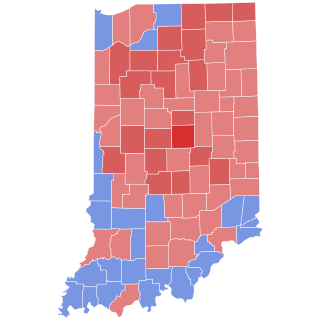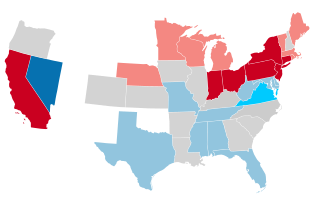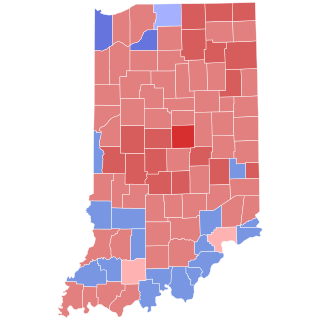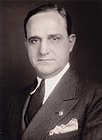
Sherman "Shay" Minton was an American politician and jurist who served as a U.S. senator from Indiana and later became an associate justice of the Supreme Court of the United States; he was a member of the Democratic Party.

These are tables of congressional delegations from Indiana to the United States House of Representatives and the United States Senate.

The 1958 United States Senate elections were elections for the United States Senate which occurred in the middle of President Dwight D. Eisenhower's second term. Thirty-two seats of Class 1 were contested in regular elections, the new state of Alaska held its first Senate elections for its Class 2 and 3 seats, and two special elections were held to fill vacancies.

The 2006 United States Senate election in Indiana was held November 7, 2006. Incumbent Republican United States Senator Richard Lugar was re-elected to his sixth six-year term with 87.3% of the vote. He did not have a Democratic opponent and only faced opposition from a Libertarian candidate; this was the only U.S. Senate race in 2006 in which Democrats did not field a candidate. This would be the last successful race of Lugar's decades long political career. This is also the last time that Lake, Marion, and Monroe counties have voted for a Republican candidate for Senate.

Raymond Eugene Willis was a United States senator from Indiana. Born in Waterloo, Indiana, he attended the public schools and graduated from Wabash College in 1896. He learned the printer's trade in Waterloo and moved to Angola, Indiana, and engaged in the newspaper publishing business in 1898. He was postmaster of Angola from 1910 to 1914 and during the First World War he served as chairman of Steuben County Council of Defense, 1917-1918.

The 1992 United States Senate election in Indiana was held on November 3, 1992. Incumbent Republican U.S. Senator Dan Coats won re-election to his first full term.

The 1980 United States Senate election in Indiana took place on November 4, 1980, along with elections to the United States Senate in other states as well as the presidential election, elections to the United States House of Representatives and various state and local elections. Incumbent Democratic U.S. Senator Birch Bayh ran for a fourth term, but was defeated by Republican nominee, U.S. Representative Dan Quayle. Dan Quayle's swearing-in marked the first time since 1959 that Republicans held both United States Senate seats from Indiana.

The 1880–81 United States Senate elections were held on various dates in various states, coinciding with the presidential election of 1880. As these U.S. Senate elections were prior to the ratification of the Seventeenth Amendment in 1913, senators were chosen by state legislatures. Senators were elected over a wide range of time throughout 1880 and 1881, and a seat may have been filled months late or remained vacant due to legislative deadlock. In these elections, terms were up for the senators in Class 1.

The 1948 United States Senate election in Kentucky took place on November 2, 1948. Incumbent Republican Senator John Sherman Cooper, who won a 1946 special election to fill the vacant seat of Commissioner of Baseball Happy Chandler, ran for a full term in office but was defeated by Democratic U.S. Representative Virgil Chapman.

The 1982 United States Senate election in Indiana was held on November 2, 1982. Incumbent Republican United States Senator Richard Lugar faced Democratic United States Representative Floyd Fithian in the general election. Lugar won with a margin of 53% of the vote, compared to Fithian's 46%. This was Lugar's closest election out of his 6 senate elections for the class 1 seat.

The 1916 United States Senate election in Indiana took place on November 7, 1916. Incumbent Democratic U.S. Senator and Senate Majority Leader John W. Kern ran for re-election to a second term in office, he was defeated by Republican Harry New, a former Chairman of the Republican National Committee.

Two United States Senate elections were held in Illinois on March 26, 1913. The two elections were interconnected through a compromise made to elect a Democrat in the regular election and a Republican in the special election.

The 1914 United States Senate election in Illinois took place on November 3, 1914.

The 1922 United States Senate election in Indiana took place on November 7, 1922. Incumbent Republican U.S. Senator Harry Stewart New ran for re-election to a second term in office, but was defeated in the Republican primary by former Republican Senator Albert J. Beveridge. In the general election, Beveridge was defeated by Democratic former Governor of Indiana Samuel M. Ralston.

The 1926 United States Senate special election in Indiana was held on November 2, 1926, to complete the unexpired term of Senator Samuel M. Ralston, who died on October 14, 1925. Interim Republican Senator Arthur Raymond Robinson, who had been appointed to fill the seat, was re-elected to finish the term over Democrat Evans Woollen.

The 1928 United States Senate election in Indiana took place on November 6, 1928. Incumbent Republican U.S. Senator Arthur Robinson, who had been appointed and elected to finish the unexpired term of Samuel Ralston, was re-elected to a full term in office.

The 1940 United States Senate election in Indiana took place on November 5, 1940. Incumbent Democratic U.S. Senator Sherman Minton ran for re-election to a second term, but lost narrowly to Republican Raymond E. Willis.

The 1954 United States Senate election in Kentucky took place on November 2, 1954. Incumbent Republican Senator John Sherman Cooper, who won a 1952 special election to fill the vacant seat of Virgil Chapman, ran for a full term in office but was defeated by Democratic former Senator and Vice President of the United States Alben Barkley.

The 1960 United States Senate election in Kentucky took place on November 6, 1960. Incumbent Republican Senator John Sherman Cooper, who won a 1956 special election to fill the vacant seat of Alben Barkley, was elected to a full term in office, defeating Democratic former Governor and Undersecretary of Labor Keen Johnson.

Sherman Minton was nominated to serve as an associate justice of the Supreme Court of the United States by U.S. President Harry S. Truman on September 14, 1949, after the death in office of Wiley Rutledge created a vacancy on the Supreme Court. Per the Constitution of the United States, Minton's nomination was subject to the advice and consent of the United States Senate, which holds the determinant power to confirm or reject nominations to the U.S. Supreme Court. The nomination was met with a mixed reception and faced active opposition stemming both from the belief that Minton would be a liberal justice and from his history as a New Deal-supporting member of the United States Senate. There was an unsuccessful effort to compel Minton to testify before the United States Senate Committee on the Judiciary. Nevertheless, the nomination was approved by a 48–16 vote of the United States Senate on October 4, 1949.





















